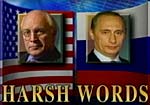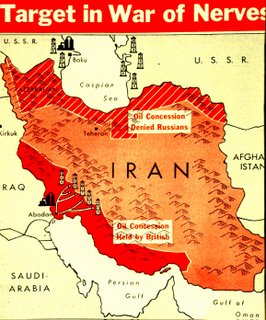Politics: A New Cold War?

Last month saw vice-president Dick Cheney at the Vilnius conference, attended by the leaders of the Baltic and Black Sea regions. He chose this conference to castigate the Russian government for abandoning the democratic reforms gained by the Russian people since the fall of communism. He said, "from religion and the news media to advocacy groups and political parties, the government has unfairly and improperly restricted the rights of the people."
He also added that some of Russian governments' actions, "have been counterproductive and could begin to affect relations with other countries"
These are harsh words indeed coming from one of the main architects of the erosion of civil liberties in his own country, and it hardly goes without saying that his last quote could equally be applied to American foreign policy since his and Dubyas' administration came to power in an election that reeked of criminal tampering and fraud.
This is a map, from 1946, that was used to illustrate one of the starting points of the Cold War. After WWII, the allied powers were busy dividing the world or, to more precise, the energy resources of the Third World. The issue here was that Soviet Union had placed troops in northern Iran in order to secure the oil fields in that region. President Truman and the British government ordered the Russians to pull out...and the Cold War was under way.
Today it is the Russians and the Chinese that are supporting the Iranians in their pursuit of nuclear energy. They have promised to veto any resolution made by the UN, concerning this crisis, that implies military intervention or the use of force. The USA, as it has already proven, is quite willing to use military force to further its' own interests anywhere in the world, with or without UN backing or approval.
Today the Russians have promised to build arms and munitions factories in Venezuela. This comes just weeks after the USA imposed a ban on the sale of weapons to that country. Venezuela is a country with vast oil resources and it seems determined to militarize itself in order to defend itself from US military intervention.
The Venezuelan government has also cemented ties with Cuba, Iran, and other countries that find themselves on the list of "unfriendly governments" targeted by the Hawks in the US administration.
Armaments and resources are at the heart of the present, and future, conflicts. The emerging industrial giants, China and Russia, find themselves in a battle with their older counterparts to control, or influence, the ever-decreasing supplies of oil.
It would seem that the Cold War is once again with us. The fight for influence and resources goes on..and on.


<< Home